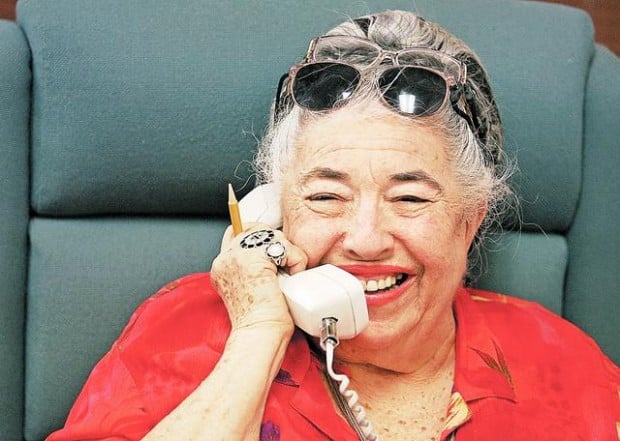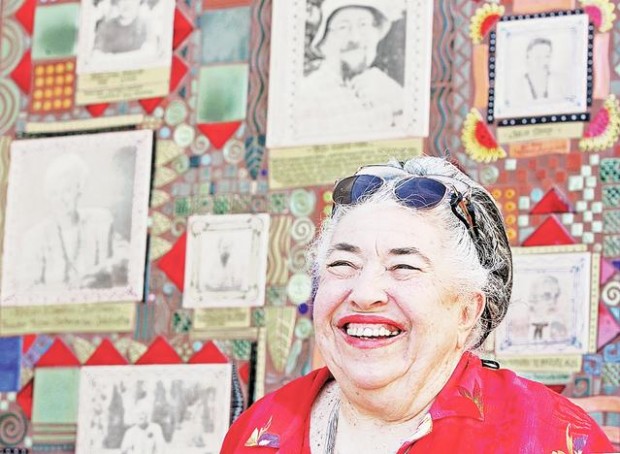After 40 years as director of the Pima Council on Aging, Marian Lupu will step down at the end of June but will continue as a consultant to the agency for the next few years.
"I'm anxious to see what the next opportunity provides me, how I can continue to be a louder voice than I am now," Lupu, 81, said Monday.
With the first of the nation's 76 million baby boomers entering retirement, society has to come to grips with one basic question, Lupu said: "How are we going to make our communities more viable for people to grow old in?"
In recent years, Lupu has publicly denied any plans to retire. She is in good health, she said, although she has used a cane, walker or wheelchair since a car accident last year.
But the Pima Council on Aging's 40-year mark wasn't lost on Lupu, a community icon known for her quirky habit of stuffing two pairs of glasses into her piled-up hair. More recently it seemed to her and the board of directors to be a good time for a change in leadership, she said.
Anna Jolivet, council president, said Lupu's role as paid consultant will enable the new director and the agency's directors to "stay in contact with the history of the organization.
"But there comes a time when you feel you need to step down and do something else," said Jolivet, who retired in 1989 as assistant superintendent of the Tucson Unified School District.
"Retirement doesn't mean you stop," Jolivet said. "It just means you change."
The Pima Council on Aging is one of hundreds of "area agencies on aging" funded through the federal Older Americans Act of 1965.
That's the same year Lupu, a public policy researcher; her husband, Charles, a biochemist; and their three children moved here from Pittsburgh.
Marian landed the job as director of what was then Tucson Council on Aging in early 1967. She worked for nine months without pay, drawing her first paycheck that October. Her budget that first year was $79,000.
The council now operates on $7 million to $8 million a year.
"She's been extremely dynamic and innovative in bringing things about," said Stewart Grabel, the group's ombudsman since 1991.
"If we just list the agencies that we have agreements with or work with very closely, it would run several pages long," Grabel said. "Hopefully this change will free her up to do even more advocacy without being fettered by having to run the day-to-day operations."
The council has been the leader in the state for aging advocacy, said Kristin Almquist, director of Gov. Janet Napolitano's Southern Arizona office and a former council employee.
"For 40 years, Marian has created the awareness of aging issues that has positioned the state to address the governor's 'Aging 2020' plan to meet the needs of the aging population," Almquist said.
Former Tucson Mayor Lew Murphy, who died in December 2005, recalled in a 2003 interview how Lupu lobbied the City Council for funding for seniors.
Lupu's usual tactic was to pack the council chambers with seniors. Murphy would call Lupu to the speaker's podium first. "Marian, just tell us what you want, and we'll get this over with," Murphy would direct her.
Elder-law attorney Allan Bogutz, who has served on the council's board since 1981, said Lupu "has a healthy and productive future ahead of her, and I look forward to seeing what she will do."
So does Bill Nugent, owner of The Shanty on North Fourth Avenue. The bar is across the street from the old Coronado Hotel, in recent years a senior-housing project managed by the council.
Nugent and Lupu have served on boards together and shared community goals.
"I have the greatest respect for Marian and her lobbying efforts, and her knowledge of aging issues," Nugent said. "She's just one of my great heroes. I know this is not her last incarnation. I know a lot of other people have things they really want her involved with."
Looking forward
Seniors 65 and older will make up 25 percent of Arizona's population by 2020, up from 16 percent in 2004. Here are the things Marian Lupu says need to happen:
• More services for seniors to help them remain in their own homes. Demand will only grow for home-delivered meals, rides to doctor appointments, someone to fix a leaky faucet and other help.
• Safe, affordable housing for seniors who require assistance.
• More jobs for seniors who want to work. That will require increased appreciation for the knowledge and skills older people can contribute.
• Pima Council on Aging satellite offices spread throughout Pima County to help seniors in their own communities.
• Contact Pima Council on Aging at 790-0504.





